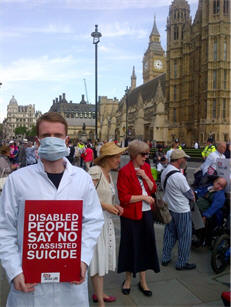Catholic Medical Quarterly Volume 65(4) November 2015
News
Defeat of Marris Bill protects vunerable patients
 It
was a real delight to be outside Parliament when news came through that
the Marris bill had been defeated by an very large majority in the House
of Commons. Several CMA members were there. There was a large group of
people demonstrating against which was well organised and had a wonderful
puppet of a judge warning us of the slippery slope (see page 26). Those
who supported the bill were also there, with placards provided by Dignity
in Dying.
It
was a real delight to be outside Parliament when news came through that
the Marris bill had been defeated by an very large majority in the House
of Commons. Several CMA members were there. There was a large group of
people demonstrating against which was well organised and had a wonderful
puppet of a judge warning us of the slippery slope (see page 26). Those
who supported the bill were also there, with placards provided by Dignity
in Dying.
Given the risks and lack of safeguards in the Bill any other outcome would have put vulnerable, elderly and frail people at real risk. But there is much to do. We must get the message across.
Well done to all who helped to defeat the Bill, including Care not Killing of which the CMA is a partner member.
Dr Peter Saunders, Campaign Director of Care Not Killing, commented:
'We welcome this unequivocal rejection of this dangerous piece of legislation by the House of Commons.
'Parliamentarians have rightly rejected the legalisation on assisted suicide and euthanasia five times since 2006 out of concern for public safety - in the House of Lords (2006 and 2009) in Scotland (2010 and 2015) and now in the House of Commons.
They have done this because they have witnessed mission creep in the tiny number of places that have changed the law to allow assisted suicide and euthanasia - countries like Belgium, the Netherlands and the American state of Oregon.
‘In Belgium, which introduced a law to help terminally ill mentally competent adults, we have seen the case of Mark and Eddy Verbessem, the 45-year-old deaf identical twins, who were killed by the Belgium state, after their eyesight began to fail. Or Nathan/Nancy Verhelst, whose life was ended in front of TV cameras, after a series of botched sex-change operations. Or the case of Ann G, an anorexia sufferer who opted to have her life ended after being sexually abused by the psychiatrist who was supposed to be treating her for the life-threatening condition. Now both Belgium and Holland have extended their law to include non-mentally competent children.
'In Oregon which is the model for this piece of legislation, assisted suicide rates have increase dramatically since its introduction. At the same time because of health care rationing we have seen those suffering from cancer refused potentially life saving and life extending treatments, while being offered the lethal cocktails of drugs to kill themself with.
‘In neighbouring Washington State six in ten people ending their lives under a similar law do so out of fear of being a burden. Just as troubling was the study that found nearly one in six were suffering from clinical treatable depression.
'This is why changing the law on assisted suicide and euthanasia is opposed by every major disability rights organisation and doctors' group, including the BMA, Royal Colleges, British Geriatric Society and the Association for Palliative Medicine.'
Dr Saunders concluded:
'The current law exists to protect those who are sick, elderly, depressed, or disabled from feeling under pressure to end their lives. It protects those who have no voice against exploitation and coercion. It acts as a powerful deterrent to would-be abusers and does not need changing.
'We hope Parliament will now turn its attention to the real issues facing our country of ensuring that everybody can access the very best care, regardless of whether they are disabled or terminally ill and that we fund this adequately.'
